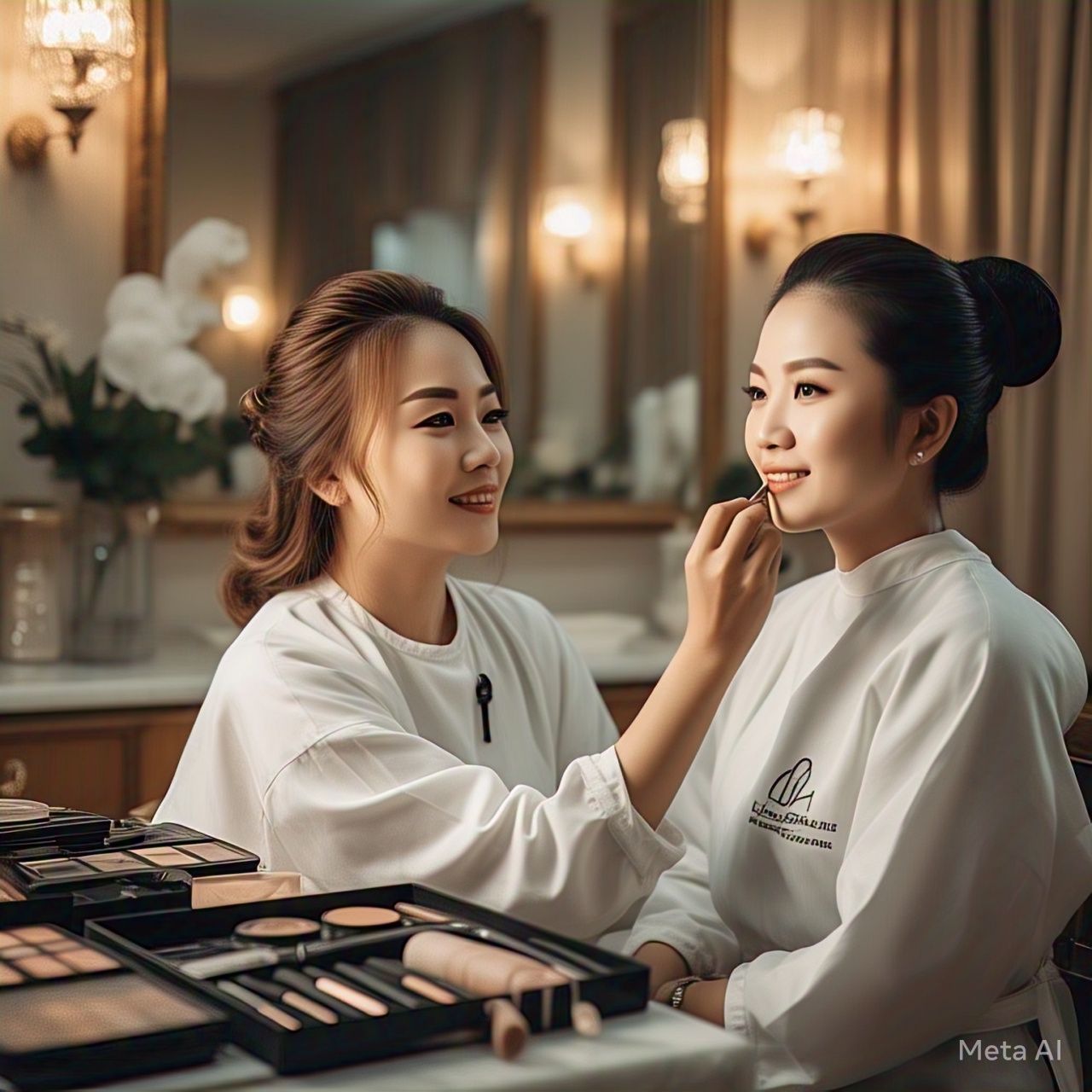Why Choosing the Right Artist Matters
A wedding is one of the most important days in a person’s life, and every detail counts. From the dress to the venue, couples spend months planning to ensure perfection. Among these crucial details, hair and makeup play a significant role in how the bride, groom, and wedding party look and feel. A skilled artist can enhance natural beauty and create a flawless look, while an inexperienced or unprofessional one can lead to stress and disappointment.
Hiring a local wedding hair and makeup artist may seem convenient, but not all professionals deliver the same level of quality. Some may lack experience, use subpar products, or have poor communication skills. To avoid last-minute disasters, couples must carefully vet potential artists before making a decision.
This article explores five major red flags to watch for when hiring a wedding hair and makeup artist nearby. By recognizing these warning signs early, couples can secure a talented professional who will help them look and feel their best on their special day.
Lack of a Professional Portfolio
One of the first things to check when hiring a wedding hair and makeup artist is their portfolio. A professional portfolio showcases their previous work, giving potential clients a clear idea of their style and skill level. If an artist cannot provide a portfolio or has only a few low-quality images, this is a major red flag.
Why a Portfolio Matters
A portfolio is more than just a collection of photos—it is proof of an artist’s expertise. Experienced professionals will have a variety of images displaying different styles, from natural bridal looks to bold, glamorous designs. Without a portfolio, there is no way to verify if the artist can deliver the desired look.
Additionally, a portfolio should include real clients, not just models. While models can showcase technical skill, real brides demonstrate how the artist works under pressure and adapts to different face shapes, skin tones, and hair textures. If an artist only has heavily edited or filtered images, this could indicate they are hiding imperfections in their work.
Signs of an Unreliable Portfolio
Some artists may claim to have experience but provide only a handful of poorly lit or outdated photos. Others might rely on stock images or photos taken from other artists’ social media pages. To avoid being misled, couples should ask for recent work samples and, if possible, contact past clients for references.
Another warning sign is inconsistency in quality. If some photos look polished while others appear amateurish, the artist may not have a reliable technique. A professional’s portfolio should demonstrate consistency in lighting, styling, and overall execution.
How to Evaluate a Portfolio
When reviewing a portfolio, couples should pay attention to details like blending, symmetry, and skin finish. Makeup should look seamless, with no harsh lines or uneven foundation. Hairstyles should be secure and free of flyaways or visible pins.
It’s also important to see if the artist’s style aligns with the desired wedding look. Some specialize in airbrushed makeup, while others focus on bohemian braids or vintage curls. If their portfolio doesn’t reflect the vision the couple has in mind, it may be best to keep searching.
A missing or weak portfolio is a clear warning sign that an artist may not be the right fit. Couples should never settle for uncertainty when it comes to their wedding day appearance.
Poor Communication and Unreliable Responses
When planning a wedding, timely and clear communication is essential. A hair and makeup artist who responds slowly, provides vague answers, or fails to confirm details can create unnecessary stress. Poor communication is a major red flag, as it often indicates unprofessionalism and a lack of respect for the client’s time.
The Importance of Professional Communication
A wedding involves multiple vendors, tight schedules, and precise timing. If a hair and makeup artist is difficult to reach or inconsistent in their replies, it could lead to misunderstandings, last-minute changes, or even cancellations. Professional artists understand that brides and grooms need reassurance and clear information, especially as the wedding day approaches.
Reliable artists respond promptly, whether by email, phone, or messaging apps. They confirm appointments in writing, provide contracts, and answer questions thoroughly. If an artist takes days to reply or gives short, unclear answers, this could be a sign of disorganization.
Warning Signs of Poor Communication
One of the first red flags is delayed responses. While everyone gets busy, a professional should reply within a reasonable time frame—ideally within 24 to 48 hours. If an artist frequently ignores messages or takes weeks to confirm availability, they may not be dependable.
Another concern is vague or evasive answers. When asked about pricing, services, or availability, a trustworthy artist provides clear details. If they avoid giving straight answers or say things like, “We’ll figure it out later,” this could mean they are not fully prepared.
Canceling or rescheduling trials last-minute is another major warning sign. A trial run is crucial to ensure the bride’s desired look, and a professional artist treats it as seriously as the wedding day itself. Frequent cancellations suggest poor time management or a lack of commitment.
How to Test an Artist’s Responsiveness
Before booking, couples can gauge an artist’s communication style by asking a few key questions:
- What is included in your bridal package?
- How far in advance should I book my trial?
- What is your policy on last-minute changes?
If the responses are prompt, detailed, and polite, the artist is likely reliable. If they seem dismissive or unclear, it may be best to look elsewhere.
Additionally, reading reviews can reveal patterns in an artist’s communication. Complaints about last-minute cancellations, unanswered messages, or confusion over contracts should not be ignored.
Why Clear Contracts Matter
A professional artist always provides a written contract outlining services, pricing, payment schedules, and cancellation policies. If an artist refuses to offer a contract or insists on verbal agreements, this is a serious red flag. Contracts protect both parties and ensure there are no surprises later.
Couples should review contracts carefully, checking for details like:
- Exact services provided (e.g., number of looks, travel fees)
- Deposit and payment deadlines
- Policies for date changes or cancellations
If anything seems unclear, they should ask for clarification before signing.
Final Thoughts on Communication
A wedding is too important to leave to chance. If an artist is difficult to reach, inconsistent, or unwilling to provide clear agreements, they may not be the right choice. Professionalism starts with communication, and couples deserve an artist who respects their time and peace of mind.
Negative Reviews or No Online Presence
In today’s digital age, reputation is everything—especially in the wedding industry. A skilled and reliable hair and makeup artist will have a visible online presence, including reviews, social media profiles, and a professional website. If an artist has overwhelmingly negative feedback, no reviews at all, or barely any digital footprint, this should raise serious concerns.
Why Reviews and Online Presence Matter
Reviews provide real insights from past clients about an artist’s professionalism, skill, and reliability. A strong online presence indicates that the artist is established, takes their business seriously, and is confident in their work. On the other hand, a lack of reviews or an inactive social media presence could mean the artist is inexperienced, has something to hide, or doesn’t prioritize client satisfaction.
Couples should look for artists with multiple positive reviews across platforms like Google, Yelp, WeddingWire, or The Knot. A few negative reviews are normal, but patterns of complaints about poor hygiene, rude behavior, or last-minute cancellations are major red flags.
Warning Signs in Reviews
When researching an artist, certain types of negative feedback should not be ignored:
1. Consistent Complaints About Quality
If multiple reviews mention issues like makeup fading quickly, hairstyles falling apart, or unblended eyeshadow, this suggests the artist lacks technical skill. A bride’s look should last all day, and poor-quality products or techniques can ruin wedding photos.
2. Reports of Unprofessional Behavior
Reviews describing an artist as rude, impatient, or dismissive indicate poor customer service. Wedding days are stressful enough—no one wants a temperamental artist adding to the tension.
3. Last-Minute Cancellations or No-Shows
If several clients mention that the artist canceled without warning or arrived extremely late, this is a huge red flag. Punctuality and reliability are non-negotiable for wedding vendors.
4. Complaints About Hygiene
Reviews mentioning dirty brushes, reused makeup sponges, or unclean tools are alarming. Sanitation is critical in professional makeup artistry, and poor hygiene can lead to skin irritation or infections.
The Danger of No Online Presence
Some artists may argue that they rely on word-of-mouth rather than online marketing. While this can sometimes be true for highly exclusive stylists, most reputable professionals today have at least a basic website or social media page.
If an artist has:
- No Google or Yelp reviews
- An empty or outdated Instagram profile
- No website or portfolio link
- Only a personal Facebook page (rather than a business page)
…it becomes difficult to verify their legitimacy. Without reviews or recent work samples, couples risk booking someone who may not deliver as promised.
How to Vet an Artist’s Reputation
To avoid unpleasant surprises, couples should:
1. Check Multiple Review Platforms
Don’t rely solely on testimonials from the artist’s own website. Look at independent sites like Google Reviews, Yelp, and wedding forums for unbiased opinions.
2. Look for Responses to Negative Reviews
A professional artist will address complaints professionally, offering solutions or explanations. If they respond defensively or ignore criticism entirely, this is a bad sign.
3. Ask for References
If reviews are scarce, request contact information for past brides. A trustworthy artist will gladly provide references.
4. Search Social Media for Real Client Photos
Instagram hashtags (e.g., #[ArtistName]Bride) or tagged photos can reveal unfiltered examples of their work.
Final Thoughts on Reputation
A wedding is too important to gamble on an artist with questionable reviews—or no reviews at all. While everyone has an off day, consistent negative feedback is a strong indicator of deeper problems. Couples should prioritize artists with a solid, verifiable track record to ensure a stress-free and beautiful wedding day look.
Unwillingness to Do a Trial Run
A trial run is one of the most critical steps in selecting a wedding hair and makeup artist. It allows the bride to test different looks, assess the artist’s skill, and ensure they are comfortable with the final style before the big day. If an artist refuses to do a trial, rushes through it, or treats it as an unnecessary formality, this is a major red flag that should not be ignored.
Why a Trial Run Is Essential
A trial session is more than just a preview—it’s a chance to see how the artist works under real conditions. The bride can evaluate their technique, hygiene practices, and ability to listen to feedback. Since wedding photos last a lifetime, a trial ensures there are no surprises on the actual day.
Additionally, trials help determine:
- How long the makeup lasts under different lighting
- Whether the hairstyle stays secure throughout movement
- If the colors and textures complement the bride’s skin tone and dress
- How well the artist adapts to last-minute changes
Skipping this step risks ending up with a look that doesn’t match the bride’s vision or, worse, one that falls apart before the ceremony even begins.
Warning Signs During a Trial
Even if an artist agrees to a trial, certain behaviors should raise concerns:
1. Rushing Through the Process
A proper trial should take at least 1-2 hours for makeup and another 1-2 hours for hair. If the artist tries to finish in under an hour, they may not be giving the look the attention it deserves.
2. Ignoring the Bride’s Preferences
Some artists insist on doing what they think is best rather than listening to the bride’s requests. While professional input is valuable, outright dismissing preferences (e.g., “This color won’t work” or “That style won’t suit you”) suggests inflexibility.
3. Poor Hygiene Practices
Dirty brushes, double-dipping into product containers, or using testers directly on the skin are unacceptable. A trial should follow the same sanitation standards as the wedding day.
4. No Photos Taken for Reference
A professional artist will take photos of the final trial look from multiple angles to replicate it later. If they don’t document the session, details may be forgotten.
Excuses to Avoid a Trial—And Why They’re Problematic
Some artists discourage trials with questionable reasoning:
- “You don’t need one—I know what I’m doing.”
Confidence is good, but every face and hair type is different. A trial ensures compatibility. - “It’s an extra cost.”
While trials aren’t always free, they’re a worthwhile investment. Be wary of artists who push to skip them to “save money.” - “We can just do it the morning of the wedding.”
This is extremely risky. If the bride hates the look, there’s no time to fix it.
How to Make the Most of a Trial
To ensure a productive session, brides should:
- Bring inspiration photos (but remain open to adjustments).
- Wear a white or ivory top to simulate the dress neckline.
- Test the look under natural and flash photography.
- Move around, laugh, and even fake-cry to check longevity.
If the artist resists these steps or seems impatient, they may not be the right fit.
Final Thoughts on Trials
An artist who dismisses trials either lacks confidence in their skills or prioritizes convenience over quality. Given how central hair and makeup are to a bride’s confidence, this step is non-negotiable. Couples should only book artists who enthusiastically encourage trials and treat them as seriously as the wedding day itself.










